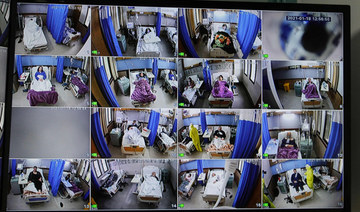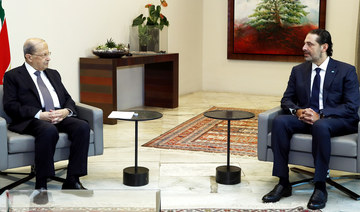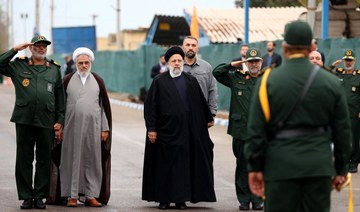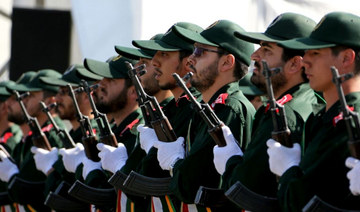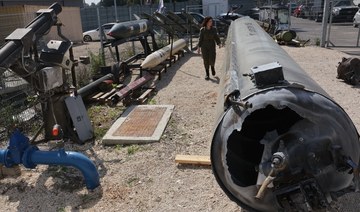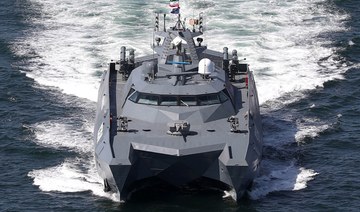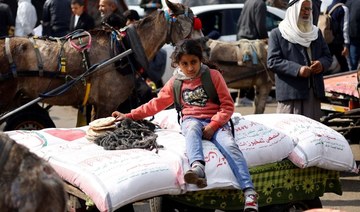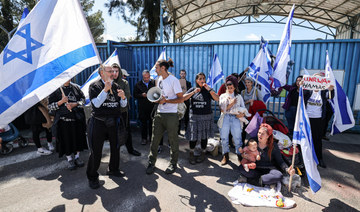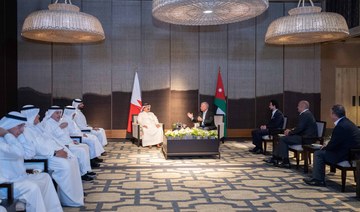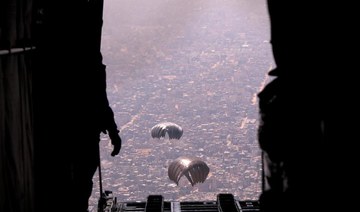BEIRUT: Death stalks the corridors of Beirut’s Rafik Hariri University Hospital, where losing multiple patients in one day to COVID-19 has become the new normal. On Friday, the mood among the staff was even more solemn as a young woman lost the battle with the virus.
There was silence as the woman, barely in her 30s, drew her last breath. Then a brief commotion. The nurses frantically tried to resuscitate her. Finally, exhausted, they silently removed the oxygen mask and the tubes — and covered the body with a brown blanket.
The woman, whose name is being withheld for privacy reasons, is one of 57 victims who died on Friday and more than 2,150 lost to the virus so far in Lebanon, a small country with a population of nearly 6 million that since last year has grappled with the worst economic and financial crisis in its modern history.
In recent weeks, Lebanon has seen a dramatic increase in virus cases, following the holiday season when restrictions were eased and thousand of expatriates flew home for a visit.
Now, hospitals across the country are almost completely out of beds. Oxygen tanks, ventilators and most critically, medical staff, are in extremely short supply. Doctors and nurses say they are exhausted. Facing burnout, many of their colleagues left.
Many others have caught the virus, forcing them to take sick leave and leaving fewer and fewer colleagues to work overtime to carry the burden.
To every bed that frees up after a death, three or four patients are waiting in the emergency room waiting to take their place.
Mohammed Darwish, a nurse at the hospital, said he has been working six days a week to help with surging hospitalizations and barely sees his family.
“It is tiring. It is a health sector that is not good at all nowadays,” Darwish said.
More than 2,300 Lebanese health care workers have been infected since February, and around 500 of Lebanon’s 14,000 doctors have left the crisis-ridden country in recent months, according to the Order of Physicians. The virus is putting an additional burden on a public health system that was already on the brink because of the country’s currency crash and inflation, as well as the consequences of the massive Beirut port explosion last summer that killed almost 200 people, injured thousands, and devastated entire sectors of the city.
“Our sense is that the country is falling apart,” World Bank Regional Director, Saroj Kumar Jha, told reporters in a virtual news conference Friday.
At the Rafik Hariri University Hospital, the main government coronavirus facility, there are currently 40 beds in the ICU — all full. According to the World Health Organization, Beirut hospitals are at 98% capacity.
Across town, at the private American University Medical Center — one of Lebanon’s largest and most prestigious hospitals — space is being cleared to accommodate more patients.
But that’s not enough, according to Dr. Pierre Boukhalil, head of the Pulmonary and Critical Care department. His staff were clearly overwhelmed during a recent visit by The Associated Press, leaping from one patient to another amid the constant beep-beep of life-monitoring machines.
The situation “can only be described as a near disaster or a tsunami in the making,” he said, speaking to the AP in between checking on his patients. “We have been consistently increasing capacity over the past week or so, and we are not even keeping up with demands. This is not letting up.”
Boukhalil’s hospital raised the alarm last week, coming out with a statement saying its health care workers were overwhelmed and unable to find beds for “even the most critical patients.”
Since the start of the holiday season, daily infections have hovered around 5,000 in Lebanon, up from nearly 1,000 in November. The daily death toll hit record-breaking more than 60 fatalities in in the past few days.
Doctors say that with increased testing, the number of cases has also increased — a common trend. Lebanon’s vaccination program is set to begin next month.
The World Bank said Thursday it approved $34 million to help pay for vaccines for Lebanon that will inoculate over 2 million people.
Jha, the World Bank’s regional director, said Lebanon will import 1.5 million doses of Pfizer vaccines for 750,000 people that “we are financing in full.” He added that the World Bank also plans to help finance vaccines other than Pfizer in the Mediterranean nation.
Darwish, the nurse, said many COVID-19 patients admitted to Rafik Hariri and especially in the ICU, are young, with no underlying conditions or chronic diseases.
“They catch corona and they think everything is fine and then suddenly you find the patient deteriorated and it hits them suddenly and unfortunately they die,”
On Thursday night, 65-year-old Sabah Miree was admitted to the hospital with breathing problems. She was put on oxygen to help her breathe. Her two sisters had also caught the virus but their case was mild. Miree, who suffers from a heart problem, had to be hospitalized.
“This disease is not a game,” she said, describing what a struggle it is for her to keep breathing. “I would say to everyone to pay attention and not to take this lightly.”
A nationwide round-the-clock curfew imposed on Jan. 14 was extended on Thursday until Feb. 8 to help the health sector deal with the virus surge.
“I still have nightmares when I see a 30-year-old who passed away,” said Dr. Boukhalil. “The disease could have been prevented.”
“So stick with the lockdown ... it pays off,” he said.
Top Lebanese hospitals fight exhausting battle against virus
https://arab.news/gcbyu
Top Lebanese hospitals fight exhausting battle against virus
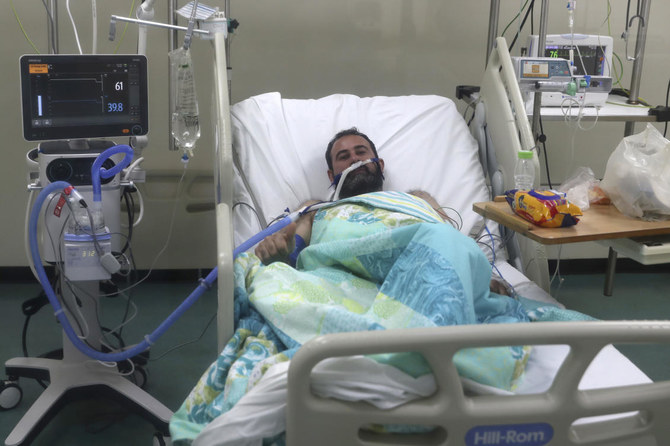
- In recent weeks, Lebanon has seen a dramatic increase in virus cases, following the holiday season
British MPs urge government to designate IRGC a terror group
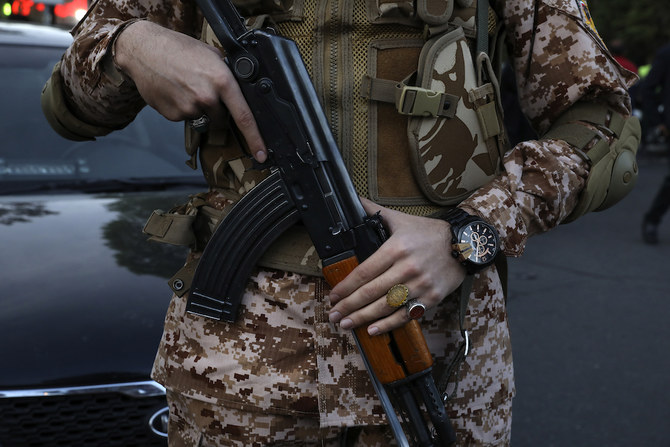
- Signatories to open letter say Iranian organization has ‘never posed a greater threat to UK’
- Proscription would put Islamic Revolutionary Guard Corps on par with Daesh, Al-Qaeda
LONDON: A cross-party group of more than 50 MPs and Lords peers in the UK have demanded that Iran’s Islamic Revolutionary Guard Corps be designated a terrorist organization.
The cross-party group, which includes former home secretaries Suella Braverman and Priti Patel, made the request in an open letter to The Times.
The IRGC is a key component of Iran’s military and power-projection capabilities. More than 125,000 personnel serve in its ranks, spread across wings including the Quds Force, the overseas element responsible for liaising with and supporting militias in Yemen, Lebanon, Iraq and Syria. In recent years, the IRGC has also built a relationship with Hamas in the Gaza Strip.
The open letter, signed by 134 people, follows last weekend’s Iranian attack on Israel, which signatories described as the “latest chapter of destructive terror by the IRGC.”
It says: “The government has combated extremism and terrorism by proscribing Hamas and Hezbollah but it is not enough.
“The IRGC is the primary source of ideological radicalisation, funding, equipment and training for these groups.
“The government must act against the root cause and proscribe the IRGC as a terrorist organisation.”
Iran’s attack was a response to Israel’s strike on its consulate in Damascus that killed 11 people, including senior commanders.
Former US President Donald Trump designated the IRGC as a terrorist organization in 2019, a year before the assassination of Qassem Soleimani, head of the Quds Force.
But the UK has been reluctant to follow the US measure for fear of breaking diplomatic communication channels with Tehran.
As part of sanctions on Iran targeting its nuclear program, however, the UK sanctioned the IRGC, freezing the assets of its members and implementing travel bans.
A terrorist designation in the UK would put the IRGC on par with Daesh and Al-Qaeda, and make it illegal to support the group, with a maximum penalty of 14 years’ imprisonment.
The 134 signatories said the IRGC has “never posed a greater threat to the UK,” accusing “thugs” belonging to the group of stabbing an Iranian dissident in London last month.
The letter was coordinated by the UK-Israel All Parliamentary Party Group, which includes former Immigration Minister Robert Jenrick.
Iran tells US it does not seek ‘expansion of tensions’
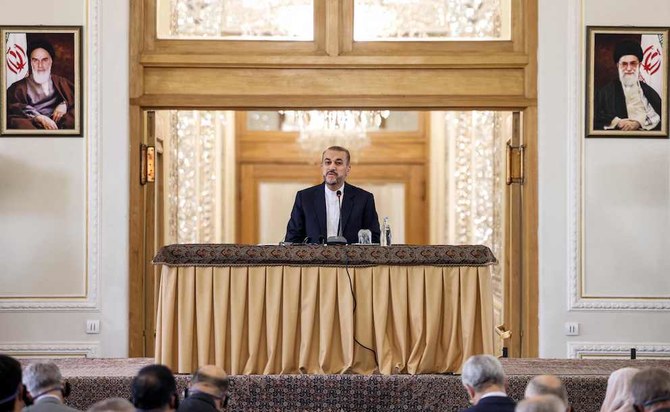
- Tehran carried out its first-ever direct attack on Israel, firing drones and missiles on the weekend
- Top envoy: Iran communicated with Washington ‘before and after’ launching its attack on Israel
TEHRAN: Iran’s top diplomat said Thursday his country has told the United States that it is not seeking escalation after an unprecedented attack on Israel.
The Islamic republic carried out its first-ever direct attack on Israel, firing drones and missiles on the weekend. The barrage — to which Israel’s army chief has vowed a response — was retaliation for an April 1 air strike on Tehran’s consulate in Damascus. Iran blamed Israel for the consular attack.
Foreign Minister Hossein Amir-Abdollahian, who is in New York to attend a UN Security Council meeting, said his country has “tried to tell the United States clearly” that Iran is “not looking for the expansion of tension in the region,” he said in a video posted by his ministry.
Iran and the United States have had no diplomatic relations since 1980, but neutral Switzerland represents Washington’s interests in Iran. Both the US and Iran have alluded to the Swiss role as an intermediary.
According to Amir-Abdollahian, Iran communicated with Washington “before and after” launching its attack on Israel.
Iran informed the United States that the decision by the Islamic Republic of Iran to “respond to the (Israel) regime is final,” and the matter concluded, he said.
Iran’s retaliation against Israel left a girl severely wounded but caused little damage. It followed the strike in Damascus that killed seven members of Iran’s Islamic Revolutionary Guards Corps, including two generals.
“Before the operation, we clearly told the American side that we will not target American bases and interests in the region,” Amir-Abdollahian said.
The Islamic republic has celebrated the attack as a success but President Ebrahim Raisi warned of “a fierce and severe response” to further “aggression” by Israel.
During his trip to New York, Amir-Abdollahian is set to meet United Nations Secretary-General Antonio Guterres and his counterparts from other countries.
The United States, Israel’s top ally, has said it would soon impose new sanctions on Iran’s missile and drone program following the strike on Israel, and said it expects allies to take parallel measures.
The US and other allies helped Israel intercept the Iranian strike.
Call to close UNRWA is attempt to strip Palestinians of refugee status — agency chief
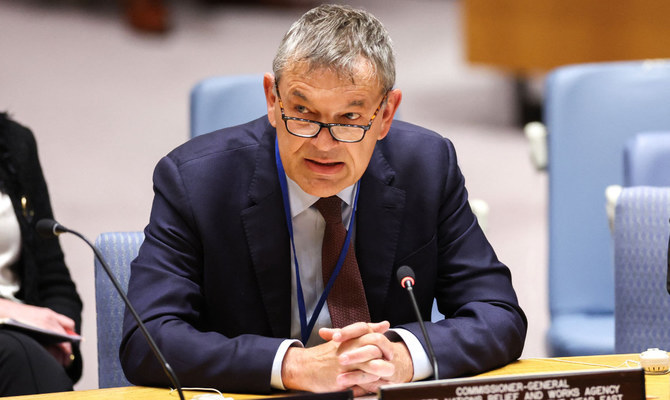
- Philippe Lazzarini tells Security Council demise of agency would also accelerate onset of famine in Gaza, and jeopardize transition from a ceasefire to recovery
- Meeting of the council requested by Jordan in response to long-running, continual attempts by Israel to force the agency out of Gaza and have it dismantled entirely
NEW YORK CITY: Disbanding the UN Relief and Works Agency for Palestine Refugees would have lasting repercussions for millions of Palestinians because it would result in them being stripped of their refugee status, the head of the agency told the Security Council on Wednesday.
Philippe Lazzarini warned it would also accelerate the onset of famine in Gaza, and jeopardize the eventual transition from a ceasefire to recovery by depriving a traumatized population of the essential services it requires.
Some of the ramifications would be long term, he added: “It will make impossible the formidable task of bringing half a million deeply distressed girls and boys back to learning. Failing to deliver on education will condemn an entire generation to despair, fueling anger, resentment, an endless cycle of violence.”
The meeting of the council was requested by Jordan in response to long-running, continual attempts by Israeli authorities to force the agency out of Gaza, and have it dismantled entirely.
It began with a minute’s silence in honor of the 178 UNRWA employees killed during the war in Gaza.
The agency has been facing great challenges not only in its efforts to provide humanitarian assistance to Palestinian civilians in Gaza, but also in ensuring it is able to continue its operations more generally.
More than 163 UNRWA installations in the Gaza Strip have been damaged during the war between Israel and Hamas, and only nine of its 24 healthcare facilities remain operational.
Meanwhile, the agency has been in a precarious financial position for some time, in part because of the decision by some major donor nations to suspend the funding they provide for the agency, which threatened to bring its operations grinding to a halt.
Several countries put their donations on hold after Israeli authorities alleged in January, without providing any supporting evidence, that 12 UNRWA workers had played a role in the Oct. 7 attacks by Hamas on Israel.
The agency terminated the contracts of the employees identified in the allegations, and the Office of Internal Oversight Services, the UN’s main investigative body, launched an inquiry at the request of UN Secretary-General Antonio Guterres.
Separately, the UN also ordered an independent review, led by the French former minister of foreign affairs, Catherine Colonna, of the steps the agency takes to uphold the principle of neutrality among its workers. The review group is expected to present its findings on April 20.
Lazzarini told council members on Wednesday that the real reason behind the Israeli calls for UNRWA to be closed down is not about its adherence to humanitarian principles, it is an attempt to end the refugee status of millions of Palestinians. The true aim is to change the long-standing political parameters for peace in the Occupied Palestinian Territories, he added.
“Accusations that UNRWA has deliberately perpetuated Palestinians’ refugee status are false and dishonest,” Lazzarini said. “The agency exists because a political solution does not. It exists in lieu of a state that can deliver critical public services.
“The international community has long attempted to contain, rather than resolve, the Israeli-Palestinian conflict. Lip service is paid to the two-state solution each time an escalation occurs, costing lives and hope.
“UNRWA was created 75 years ago as a temporary agency, a stop-gap measure, pending a political answer to the question of Palestine.
“If the international community truly commits to a political solution, UNRWA can retrieve its temporary nature by supporting a time-bomb transition, delivering education, primary healthcare and social support. It can do so until a Palestinian administration takes over the services.”
Russia’s permanent representative to the UN, Vasily Nebenzia, called on the Security Council to consider, as a matter of urgency, imposing sanctions on Israel for its failure to implement the council’s recent ceasefire resolution.
“Everyone knows about the facts, the unthinkable statistics, the number of people dead and those in need of urgent food and medical assistance, as well as reported cases of people dying of famine and dehydration, including minors,” he said.
“The IDF (Israel Defense Forces) is blocking half of humanitarian convoys, yet aid supplies are waiting at the border. We warned time and time again that in the absence of a lasting, sustainable ceasefire, which must be duly monitored by military observers, all of our humanitarian efforts are doomed.”
The US deputy ambassador to the UN, Robert Wood, said the conflict in Gaza has been one of the worst in recent memory in terms of the number of aid workers killed, with the total standing at more than 240 since Oct. 7.
“These incidents are unacceptable. Humanitarian personnel must be protected, full stop,” he said, and he expressed deep concern that “Israel has not done enough to protect humanitarian aid workers or civilians.”
Wood added: “UNRWA plays a crucial role throughout the region, contributes to stability of the region and supporting Palestinian refugees, to educating hundreds of thousands of students, to providing primary healthcare and critical relief and social services.
“UNRWA is the bedrock of support for the most vulnerable Palestinian refugees in Jordan, Lebanon, Syria and the West Bank. The United States supports this important work and emphasizes that it must continue uninterrupted.”
Call to close UNRWA is attempt to strip millions of Palestinians of refugee status: agency chief
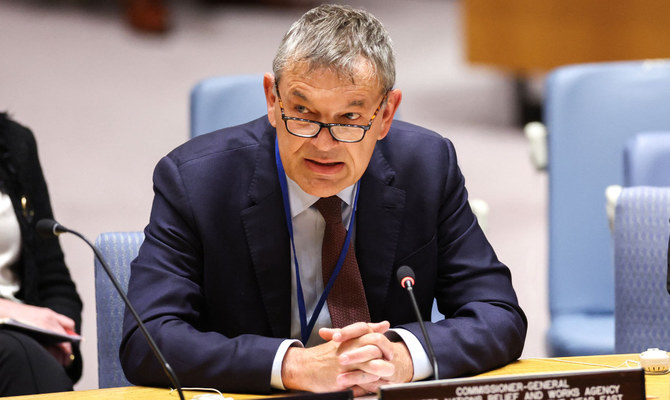
- Philippe Lazzarini tells Security Council demise of agency would also accelerate onset of famine in Gaza, and jeopardize transition from a ceasefire to recovery
- Meeting of the council requested by Jordan in response to long-running, continual attempts by Israel to force the agency out of Gaza and have it dismantled entirely
NEW YORK CITY: Disbanding the UN Relief and Works Agency for Palestine Refugees would have lasting repercussions for millions of Palestinians because it would result in them being stripped of their refugee status, the head of the agency told the Security Council on Wednesday.
Philippe Lazzarini warned it would also accelerate the onset of famine in Gaza, and jeopardize the eventual transition from a ceasefire to recovery by depriving a traumatized population of the essential services it requires.
Some of the ramifications would be long term, he added: “It will make impossible the formidable task of bringing half a million deeply distressed girls and boys back to learning. Failing to deliver on education will condemn an entire generation to despair, fueling anger, resentment, an endless cycle of violence.”
The meeting of the council was requested by Jordan in response to long-running, continual attempts by Israeli authorities to force the agency out of Gaza, and have it dismantled entirely.
It began with a minute’s silence in honor of the 178 UNRWA employees killed during the war in Gaza.
The agency has been facing great challenges not only in its efforts to provide humanitarian assistance to Palestinian civilians in Gaza, but also in ensuring it is able to continue its operations more generally.
More than 163 UNRWA installations in the Gaza Strip have been damaged during the war between Israel and Hamas, and only nine of its 24 healthcare facilities remain operational.
Meanwhile the agency has been in a precarious financial position for some time, in part because of the decision by some major donor nations to suspend the funding they provide for the agency, which threatened to bring its operations grinding to a halt.
Several countries put their donations on hold after Israeli authorities alleged in January, without providing any supporting evidence, that 12 UNRWA workers had played a role in the Oct. 7 attacks by Hamas on Israel.
The agency terminated the contracts of the employees identified in the allegations, and the Office of Internal Oversight Services, the UN’s main investigative body, launched an inquiry at the request of UN Secretary-General Antonio Guterres.
Separately, the UN also ordered an independent review, led by the French former minister of foreign affairs, Catherine Colonna, of the steps the agency takes to uphold the principle of neutrality among its workers. The review group is expected to present its findings on April 20.
Lazzarini told council members on Wednesday that the real reason behind the Israeli calls for UNRWA to be closed down is not about its adherence to humanitarian principles, it is an attempt to end the refugee status of millions of Palestinians. The true aim is to change the long-standing political parameters for peace in the Occupied Palestinian Territories, he added.
“Accusations that UNRWA has deliberately perpetuated Palestinians’ refugee status are false and dishonest,” Lazzarini said. “The agency exists because a political solution does not. It exists in lieu of a state that can deliver critical public services.
“The international community has long attempted to contain, rather than resolve, the Israeli-Palestinian conflict. Lip service is paid to the two-state solution each time an escalation occurs, costing lives and hope.
“UNRWA was created 75 years ago as a temporary agency, a stop-gap measure, pending a political answer to the question of Palestine.
“If the international community truly commits to a political solution, UNRWA can retrieve its temporary nature by supporting a time-bomb transition, delivering education, primary healthcare and social support. It can do so until a Palestinian administration takes over the services.”
Russia’s permanent representative to the UN, Vasily Nebenzia, called on the Security Council to consider, as a matter of urgency, imposing sanctions on Israel for its failure to implement the council’s recent ceasefire resolution.
“Everyone knows about the facts, the unthinkable statistics, the number of people dead and those in need of urgent food and medical assistance, as well as reported cases of people dying of famine and dehydration, including minors,” he said.
“The IDF (Israel Defense Forces) is blocking half of humanitarian convoys, yet aid supplies are waiting at the border. We warned time and time again that in the absence of a lasting, sustainable ceasefire, which must be duly monitored by military observers, all of our humanitarian efforts are doomed.”
The US deputy ambassador to the UN, Robert Wood, said the conflict in Gaza has been one of the worst in recent memory in terms of the number of aid workers killed, with the total standing at more than 240 since Oct. 7.
“These incidents are unacceptable. Humanitarian personnel must be protected, full stop,” he said, and he expressed deep concern that “Israel has not done enough to protect humanitarian aid workers or civilians.”
Wood added: “UNRWA plays a crucial role throughout the region, contributes to stability of the region and supporting Palestinian refugees, to educating hundreds of thousands of students, to providing primary healthcare and critical relief and social services.
“UNRWA is the bedrock of support for the most vulnerable Palestinian refugees in Jordan, Lebanon, Syria and the West Bank. The United States supports this important work and emphasizes that it must continue uninterrupted.”
Jordan says Israeli retaliation for Iran strikes risks wider regional war
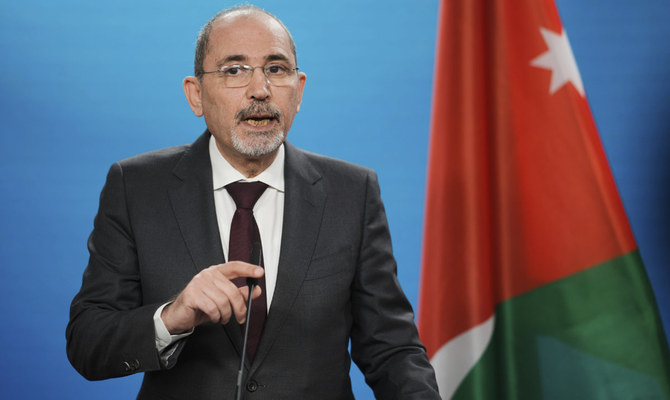
- Safadi warned that his country would act firmly in the event of another flare-up and that Jordan would not allow “either Iran or Israel to turn the kingdom into a battlefield”
AMMAN: Jordan’s Foreign Minister Ayman Safadi said on Wednesday an Israeli retaliation against Iranian strikes could bring a real risk of dragging the whole region into a devastating war.
In an interview released by state media, Safadi said his country was lobbying major powers against an escalation that would have far-reaching consequences for regional stability and security.
“The risks are enormous. That could drag the whole region into war, which would be devastating to us in the region and we’ll have very, very serious implications for the rest of the world including the U.S,” Safadi said.
“The situation is too dangerous. The chances of regional explosion are real, and that has got to stop. We’ve got to make sure there’s no further escalation,” he added.
Staunch US ally Jordan, with the help of American air defenses and support from the UK and France, shot down most of the Iranian drones and missiles that were flying over the country toward Jerusalem and a wide range of targets in Israel.
“Now the pressure should be on Israel not to escalate,” Safadi said, adding Tehran had said it attacked in retaliation for a suspected Israeli airstrike on its embassy compound in Damascus on April 1 and would not go further unless Israel responded.
Jordan neighbors Syria and Iraq – both countries where Iranian proxy forces operate – and is next door to Israel and the Israeli-occupied West Bank
“We are in the middle of the fire, so both parties have to understand that we’ll do what we have to do to protect our own, and to prevent this escalation,” Safadi said.
Safadi warned that his country would act firmly in the event of another flare-up and that Jordan would not allow “either Iran or Israel to turn the kingdom into a battlefield.”
“We will take down any projectiles that threaten our peoples and violate our sovereignty, and pose a threat to Jordanians. And we made this clear to both Israel and Iran,” he said.
Iranian drones that came from the direction of Iraq and flew over southern Jordan and the city of Aqaba that were heading to Israel’s Eilat port were also intercepted.
Israeli Prime Minister Benjamin Netanyahu was using the confrontation with Iran to divert attention from Gaza, Safadi said. The Israeli leader should not be allowed to drag “Washington and major Western powers into a war with Iran,” he added.



